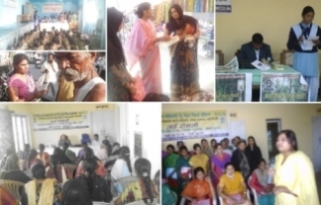SEVAK
Samaj Kalyan Evam Vikas Adhyayan Kendra
Sustainable Agriculture
Agriculture in India has changed dramatically, especially since the Green Revolution in late 1960s. Food and fibre productivity soared due to new technologies, mechanisation, increased chemical use, specialisation and government policies that favoured maximising production. These changes allowed farmers with reduced labour demands to produce their crops.
Although these changes have had many positive effects and reduced many risks in farming, there have also been significant costs. Prominent among these are topsoil depletion, groundwater contamination, decline of family farms, continued neglect of the living and working conditions for farm labourers, increasing costs of production, and the disintegration of economic and social conditions in rural communities.
During the past two decades a growing movement has emerged to question the role of the agricultural establishment in promoting practices that contribute to these social problems. Today this movement for sustainable agriculture is garnering increasing support and acceptance within mainstream agriculture. Not only does sustainable agriculture address many environmental and social concerns, but it offers innovative and economically viable opportunities for growers, labourers, consumers, policymakers and many others in the entire food system.
Sustainable agriculture integrates three main goals – environmental health, economic profitability, and social and economic equity. People in many different capacities, from farmers to consumers, have shared this vision and contributed to it. Despite the diversity of people and perspectives, the following themes commonly weave through definitions of sustainable agriculture. Sustainability rests on the principle that we must meet the needs of the present without compromising the ability of future generations to meet their own needs.
In Uttar Pradesh, quite a few NGOs are championing the cause of sustainable agriculture. One of them is Gorakhpur Environmental Action Group (GEAG), Gorakhpur. Under the umbrella of GEAG, there are scores of NGOs who are making efforts to create awareness about sustainable agriculture in their respective areas of operation. SEVAK has collaborated with GEAG for promotion of sustainable agriculture in its area of operation. It is regularly organising Training of Trainers (ToT) for cultivation of medicinal herbs and diversification of agriculture. While doing so, the emphasis is always on sustainability of agriculture.
